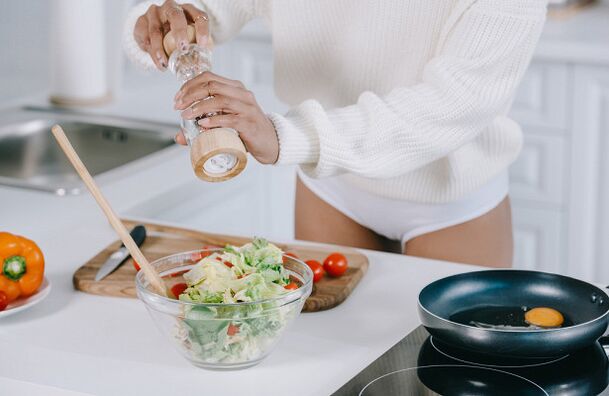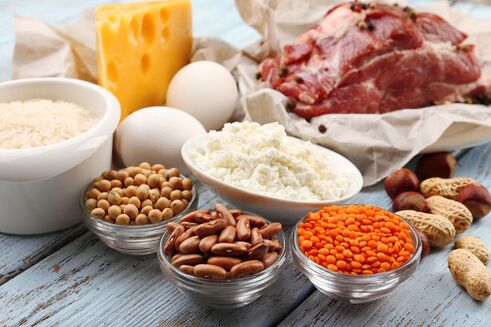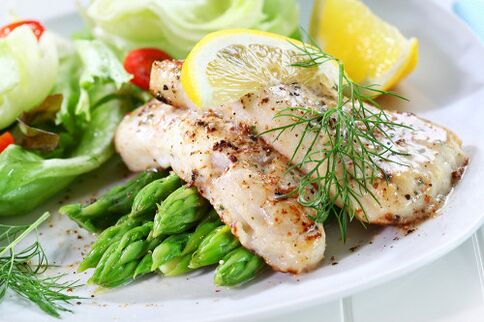 Protein diet rules for quick weight loss and approximate menu for a week.
Protein diet rules for quick weight loss and approximate menu for a week.In the circles of losing, it is assumed that the protein diet is the most effective and greatest for a quick weight loss.However, it is necessary to strictly observe certain nutritional rules in order not to damage health.
According to experts, the average value of the daily body for proteins can be calculated as follows: 1 gram of protein per 1 kilogram of weight.However, the principle of protein diet is the prevailing use of food that is rich in protein in combination with a low carbohydrate content.Such a diet makes the metabolism output the accumulated fat reserves and enables them to lose weight quickly and long.
Advantages of a protein diet
First, the protein diet menu varies.The necessary proteins are not only contained in meat, fish and eggs, but also in legumes, nuts, seeds and even some vegetables.
Secondly, the food that is rich in proteins quickly saturates the body and are digested for a long time, which is why there is no obsessive wish to have a bite to eat after a short time after eating.

The damage to a protein diet
The main thing that you should remember: The effect of a protein diet is only achieved in combination with sufficient and regular physical activity.Otherwise, compliance with the principles of a protein diet can harm the body irreparable.
The methods unused to restore the muscles form nitrogen compounds that the body does not need, so that it actively removes them through the kidneys and overloaded them.Over time, this can lead to urolithiasis.Nutritionists recommend combining protein with fiber, of which the required amount of vegetables and fruit contains.You also have to drink about two liters of water during the day.
Which products belong to protein
You can get protein from two main sources:
Plant protein:
- soy
- Bobs
- Lentils
- Nuts and seeds
- zucchini
- Cauliflower
- Leaf salad
- Mushrooms
Animal protein:
- Milk and dairy products
- Egg
- Meat and overdoors
- Fish and seafood

Sample protein -diet menu for a week:
The first day
- Breakfast: 200 grams of cheap cottage cheese
- Snack: green apple
- Lunch: 100 grams of baked chicken breast and boiled asparagus
- Snack: low -fat yogurt
- Dinner: 200 grams of baked fish and a portion of vegetable salad
The second day
- Breakfast: 150 grams of cooked beef and a piece of whole grain bread
- Snack: grapefruit
- Lunch: 100 grams of tofu with a portion of steamed vegetables
- Snack: Kefir
- Dinner: 150 baked chicken breast and leaf salad
The third day
- Breakfast: 2 cooked eggs, a piece of light cheese (fat content 9-7%)
- Snack: green apple and 10 grams of nuts
- Lunch: 100 grams of seafood grille and cabbage salad
- Snack: a portion of cottage cheese
- Dinner: 200 grams of cooked fish and vegetables for a couple
The fourth day
- Breakfast: a portion of yogurt and 2 celery stires with Arachyis paste
- Snack: orange
- Lunch: 150 grams of baked turkey and salad made of tomatoes and cucumbers
- Snack: a glass fermented baked milk
- Dinner: 150 grams of beef and 100 grams of cooked broccoli
Fifth day
- Breakfast: omle of 2 eggs and a portion of cooked cauliflower
- Snack: grapefruit
- Lunch: 200 grams of fish and part of the lenses
- Snack: a glass of kefir
- Dinner: 150 grams of baked chicken and 1 baked zucchini
Sixth day

- Breakfast: 150 grams of cottage cheese and a piece of whole grain bread
- Snack: green apple and several almond kernels
- Lunch: 200 grams of cooked beef and cabbage salad
- Afternoon snack: part of Greek yogurt
- Dinner: 150 grams of cooked fish, 1 cucumber, leaf salad
Seventh day
- Breakfast: 200 grams of kefir and a handful of pine seeds
- Snack: banana
- Lunch: 200 grams of baked turkey and cooked green beans
- Snack: a glass fermented baked milk
- Dinner: 150 grams of seafood on grill and vegetable salad


































